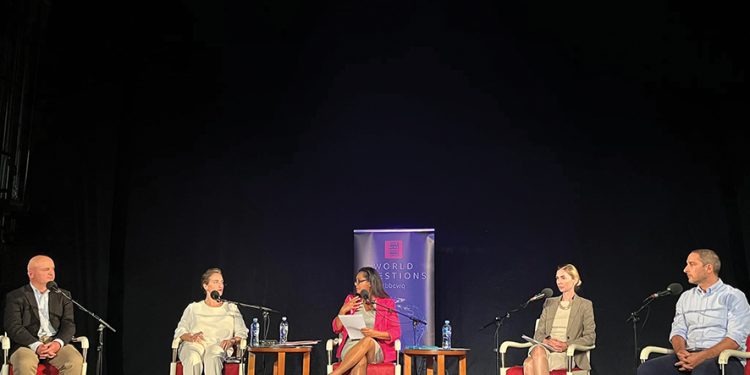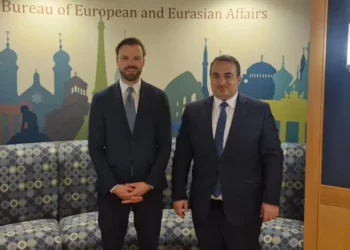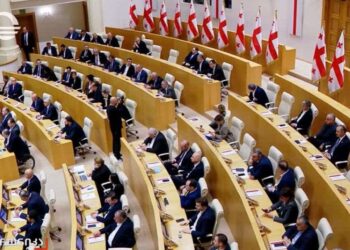BBC World Questions, a BBC World Service radio program that “puts people and their questions at the heart of the debate,” was in Tbilisi this week to bring together leading figures and the public to discuss the issues that “matter most to the people of Georgia” – recorded in the Liberty Theater and set for broadcast to an audience of 318 million around the globe this Saturday.
Presented and moderated by Anu Anand, a panel of politicians and opinion formers joined a debate led by questions from an eager public audience made up of Georgians, Europeans, and some from as far away as Australia.
For the first time, Members of Parliament from both the ruling Georgian Dream (Mariam Lashkhi) and the opposing United National Movement (Tina Bokuchava) parties appeared together on stage. They were joined by Kornely Kakachia, Professor of Political Science at Tbilisi State University, and Philosopher Levan Ghambashidze.
“Over 150 members of the public came to the event,” Helen Towner, Series Producer of BBC World Questions, told GEORGIA TODAY. “We received hundreds of questions and chose six to debate. The debate was heated and lively. We expected this, as we were discussing matters that mean so much to the people of Georgia, namely membership of the EU and relations with Russia. The audience were free to give their opinions as well, and this made for some very compelling radio.
“We were so glad that we managed to get two politicians from the two main opposing parties to share a platform and debate in front of the public. At times, the two politicians clashed – this is far from unusual – it happens around the world. We hope we were able to illustrate to our global audience what matters most to the people of Georgia right now.”
Questions were asked on the country’s possible accession to the European Union, its relations with Russia, the fight against climate change, and what it is that makes Georgia a stand-out country.
Note that the comments you read below have been redacted due to space limitation, yet remain fully faithful to their original content and meaning. The event itself can be heard on BBC’s World Service website from Saturday, September 16.
With two months until Georgia gets an answer on the longed-for EU Candidate Status, and with only three of last year’s 12 European Commission recommendations fully fulfilled, Georgia continues to be plagued by political polarization, and this was very evident throughout the BBC discussion. Georgia’s European future was the first question the audience sought an answer to, in short: What is the plan?
“Georgia is part of the European family, it’s part of our history,” Georgian Dream (GD)’s Mariam Lashkhi said. “Europe is the choice of more than 80% of Georgians and it is a choice that has been confirmed by the government, first when the Association Agreement was signed. Every institution is involved in getting us there, but it needs time. We cannot fulfill the recommendations without strong institutions in place. We established working groups but, unfortunately, the opposition refused to cooperate.”
“The EU and NATO are our best assurance against a deluded Putin. We are part of the political process, yes, but the agency to implement political reform lies with GD,” the opposition’s Tina Bokuchava responded. “The message Josep Borrell delivered during his visit to Georgia last week is that EU accession is a merit-based process. Blame cannot be shifted to the opposition for the inability of GD to implement reforms. There is a lack of political will to implement [the 12 recommendations]. Don’t blame the thermometer if you don’t like the temperature! You are merely deflecting responsibility.”
And so began an entertaining, yet sadly unfruitful, two hours of political back-and-forth while both parties sought to avoid accountability or moves toward achieving anything resembling progress. Thankfully, we had an academician and philosopher there for some balance.
Professor Kakachia, on the topic of Georgia fulfilling those 12 recommendations, suggested that the EU should better define its definition of “deoligarchization,” and rightly pointed out that, at the time the Association Agreement was signed, Georgia was ahead of Moldova and Ukraine [who were given candidate status in 2022]. “[Yet], since the war began, Georgia has failed in its foreign policy toward Ukraine,” he acknowledged. “It has lost its moral compass in terms of foreign policy and security, which needs to be in line with EU foreign policy. It was the frontrunner of the Eastern Partnership for many years. The attitude of the Georgian government toward Ukraine has been all but toxic, and this has naturally raised a lot of questions among our EU partners.”
The audience was asked its opinion of the first topic, and while (un?)surprising protest was shown by some Georgian audience members when non-Georgians offered their views, it was widely agreed that while the Georgian people deserve EU membership, the government has not done enough to secure the possibility thus far, especially when it deviates from the EU policy on bans on flights from Russia (Georgia is currently wide open and welcoming to Russian visitors), and begins a process of impeachment of the current president for her trip to the EU, during which she openly sought support for Georgia’s EU candidacy.
“The impeachment does follow EU values,” Ms. Lashkhi argued. “I was very proud to have the first female president, but she must stick to her constitutional rights. She must coordinate foreign policy with the government!”

The “Russian Law” that GD tried to introduce earlier this year was brought up – a move that split the country and caused heated street protests outside parliament, further exacerbating the political polarization. Ms Lashkhi repeated the well-trodden message given by GD that the law had been “misunderstood and misrepresented” by the public and media, and that it was not Russian, but a copy of US law. When Ms. Bokuchava quoted ex-US Ambassador Kelly Degnan’s at-the-time response to that, the GD-supporters in the audience booed her.
“How do you expect people to unite? True, the polarization is more seen between the political parties than between the public, yet the instruments [to change that] lie in the hands of the government,” philosopher Ghambashidze suggested.
Saakashvili was cited by the opposition MP as another example of GD’s failings to please the West, with her calling it “political revenge,” and saying that since the Saakashvili government, which transformed Georgia from a failed state, Georgia had been “backsliding.”
“We work together for the citizens, we transformed the country into a pluralistic parliament of 9 parties,” Lashkhi countered. “And in Saakashvili’s case, the European Court of Human Rights itself dismissed his perceptions of illness. Anyone, be they president or citizen, is responsible to the rule of law.”
“It is crucial to push politicians toward a consensus policy, a coalition government, though this is not naturally part of our culture,” Prof. Kakachia put in. “Parties don’t address public concerns. There is extreme partisanship across the board – in the public, the media. Georgian political parties see it as zero-sum game. Even if we get a regime change in next year’s elections, the political culture needs to change. And it can’t change overnight. Change will come through civil society, through academia…”
It was then agreed within the audience that the electorate of both parties at least seem to agree on the direction of Georgia’s foreign policy. It was suggested that the rhetoric should be the first thing to change, seeing GD speaking of the opposition as “partners” rather than “enemies,” ceasing all rhetoric labelling the country’s western partners as “enemies,” and having ruling party MPs agree to speak on opposition TV shows, which reach an audience outside their usual pro-GD scope.
Moving on, the question “Can Georgia balance between maintaining good relations with neighbors such as Russia, and the EU?” was introduced.
GD’s Mariam Lashkhi gave an adamant “No” to the idea of Georgia’s ever being “friends” with Russia.
“Georgia is in a turbulent region,” she noted. “But Georgia is tolerant, maintaining good relations with all except Russia – 20% of our land is occupied by Russia. There are no diplomatic relations. Our foreign policy clearly dictates our Western direction. It is not possible to have good relations with Russia. Yes, we trade with Russia, but it is just 0.03%. In comparison, the EU sent 20 million Euro to Russia for gas. But no one accuses them of supporting Russia. We warned [the West] in 2008 about relations with Russia, but the West chose to push the ‘refresh’ button on that relationship. We have never forgotten, nor did we need [the conflicts in] Crimea or Ukraine to ‘remind us.’ We do not have ‘breakaway’ regions – they are occupied and should be named as such by all. Blame Russia – we do!” she said.
It was perhaps the one point of the evening the UNM’s representative, Tina Bokuchava, could briefly agree with her on: “Georgia needs to join NATO. While we have all seen the blackmail from Putin, including the threat of using nuclear weapons, we also see he is hesitant to pick a fight with a NATO country. And yet, if GD was interested in joining the EU, we wouldn’t be seeing this democratic backsliding, the cancelling of NATO exercises. Last week, Josep Borrell noted with regret that the alignment of Georgian policy with the EU had dropped [to 43%] since the Ukraine invasion.”
In an attempt to bring the discussion back to the point in hand, presenter Anu Anand noted that 89% of Georgia’s population says that Russia poses the biggest threat to Georgia, and then invited the audience to comment on Georgia’s ability to balance between good relations with Russia and the EU.
One of two Russians in the audience spoke up: “Impossible! Russia is an aggressor, an occupier. The Georgian government is trying to sit on two chairs – Western and Russian. Most Russians who live here in Georgia cannot be friends with Russia. So how could Georgians want to be friends [with them] under this government?
“Can there be peace?” one audience member wondered. “Not for at least another 10 years under this government, where Georgians are looked down on as subservient to Moscow!”
“The GD policy is to ‘keep the peace,’” Mr Ghambashidze noted. “But that question of peace comes on Russian terms. The same was seen in the Roman Empire – peace achieved through oppression of the people. Russia offers peace, that Georgia will not be attacked, by blackmailing us with terms we cannot and should not accept, like the Georgia of soviet times – living with no independence, people killed, and the Georgian identity decided by the Russians.”
Perhaps as an intended respite from the politics, Ms Anand invited a civil activist to ask the panel about climate change and the environment. She questioned why the Georgian people are not more vocal on the issue. Unfortunately, the two politicians present quickly returned to criticizing each other for what was or wasn’t done to prevent the recent Shovi landslide tragedy, until Ms Anand steered them back.
“Climate change does need to be discussed widely and more reforms made to safeguard the environment,” GD’s MP recognized, while Ms Bokuchava noted that, “Polls show that Georgian citizens are increasingly concerned by climate change and air pollution, particularly in urban areas. Yet politicians lag behind in responding. Politicians must respond to the rising concerns, but are held back from doing so by GD.”
Prof. Kakachia pointed out it is a question of accountability. “Georgia is one of the poorest countries in the Eastern Partnership, so logically we should have a strong socio-democratic party, but we never have had. And what is academia doing on the climate change message? TV, radio – few programs talk about it. And from there it should be brought to the policy level.”
“People are more worried about what Misha Saakashvili is eating in the clinic than climate change,” Ms Lashkhi noted, to a round of “boos” from the audience.
A potentially refreshing topic was then introduced to the panel: What is the unique way of being that Georgia offers the world?
Philosopher Ghambashidze stumbled to answer, wondering where to begin, and reluctant to suggest the mundane “khinkali” and “tourism,” but encouraged ahead anyway by the British presenter who is new to everything wonderful about Georgia. Ms Anand mentioned she was surprised, however, that he, historian and philosopher, hadn’t suggested “bravery,” or “resistance” as Georgia’s unique ways of being, at which point Ms Bokuchava stepped in. “Yes, resilience. For centuries, Georgia has been at the crossroads of empires and yet kept its language, culture, religion. And that resilience will prevail, even under the current government, as we strive for democracy.”
Ms Lashkhi countered with a more optimistic note: “Creativity, backed up by strong history. Alphabet, language, architecture, wine-making- Georgia is the cradle of wine. Being innovative and striving for the future, and this is what Georgia can bring to the EU: innovation, resilience and freedom.”
To this list, Professor Kakachia elaborated with “hospitality, culture. We are a small nation, proud of our history. Georgian political elites often talk of ‘the return of Georgia to the European family.’ To us, that ‘family’ represents, for example, our shared Christian roots, our shared experience within the Byzantine Empire. Georgians don’t want to be a simple member of the EU, but to bring their own original culture to enrich European culture, and perhaps this is not a concept well understood in the EU capitals.”
One audience member then added, “Georgia is a country of great minds, a hub in the region for innovation and technology. Silicon Valley comes here to finance startups. This is a great country for investment!”
To this, others added polyphony, folk traditions, dancing, tolerance, nature and friendship. As Ms Anand noted, “friendship” was a nice note to end on, and yet it was clear to all present that the political spectrum of Georgia has a long way to go before that word becomes a recognized part of its rhetoric towards its fellows, a fact which doesn’t bode well for Georgia’s EU aspirations. Let’s hope that those who listen to the BBC program this weekend hear the Georgian people and their aspirations over the fruitless squabbling of the country’s politicians!
By Katie Ruth Davies














